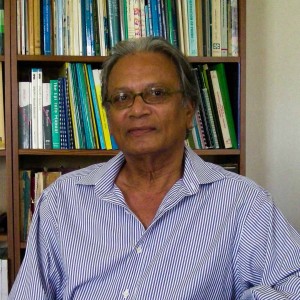By Samuel Sukhnandan

Dr Rupert Roopnaraine
As the University of Guyana (UG) celebrates 50 years of existence, there is much to be proud of, but yet there are still many areas which need serious attention for the institution to develop into one that meets international standards.
The “Jagan Night School”, as it was previously called, churns out approximately 2000 students yearly. This number is likely to grow, as the Guyanese economy continues to expand, thereby creating more job opportunities for a growing population.
The demand for higher education is also likely to increase as well. These are all reasons for the university to constantly improve, to meet the demands of the 21st century.
Touching on the positive achievements made by the university, there is no doubt that some improvement has taken place over the years that has helped to improve the university’s status. The most evident of these examples is the move to strengthen certain programmes, especially in the Social Sciences Faculty.
Study
Besides this, there are many programmes being offered at the university that do not attract a large number of students and are not relevant to Guyana’s changing economy. These and other issues were identified as part of a study done by Trevor Hamilton and Associates, an international management consultant firm, which carried out a study in 2012.
The study focused on enhancing the regulatory framework and operational procedures systems and structures at the university.
The consultants found that government’s financial contribution is declining as a percentage, and in real terms, mainly due to extremely limited fiscal capacity.
In its review of effectiveness and the possibilities for improvement, the firm found that there are currently no policy mechanisms to encourage private investment in educational services at UG.
It was also noted in the report that the governance regime of the tertiary institution is primarily government bureaucracy, with 42 percent of the council members being politically and government appointed.
The more damaging of these findings is that the legal and governance structures are inhibiting private investment. Added to that, it found that UG can ill-afford to recruit and retain staff because salaries are determined by government wage containment policies.
The study also found that UG is not exploiting the opportunities to operate profit centres and its potential network of connections with employers, mainly in the private sector, as well as the Guyanese diaspora, professional organisations and its alumni.
It also found that UG does not have enough legal provisions to effectively mobilise income from non-tuition and non-government resources.
Further, the consultants found that there is no rigid accountability for performance and productivity, with its viability threatened, because it over-concentrates on high school graduates and only 0.6 percent of the student population is foreign students, mainly because UG is not a high-tech labour-market oriented institution.
Crisis
UG Council member, Dr Rupert Roopnaraine told Guyana Times International that it is generally recognised that there is a crisis as it relates to finance and governance operations of the council, faculty and department.
A special committee that will oversee the appointment of a new council that will work to transform UG is being chaired by Dr Roopnaraine.
The committee will be resuming work during the next sitting to look at appointing a new, fully constituted council to ensure that UG has a governing body that has the capacity to transform the institution into a true national asset.
The committee will also be looking at recommendations that relate to the amendments to the laws and statutes of the university.



